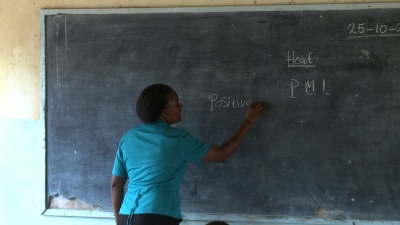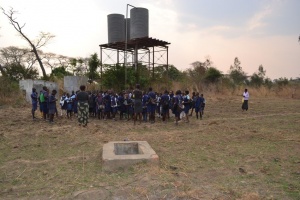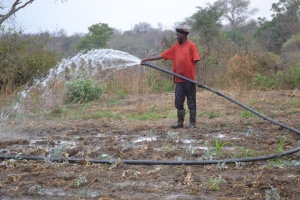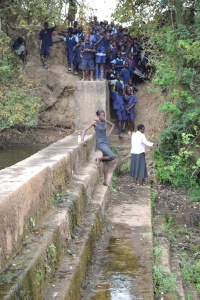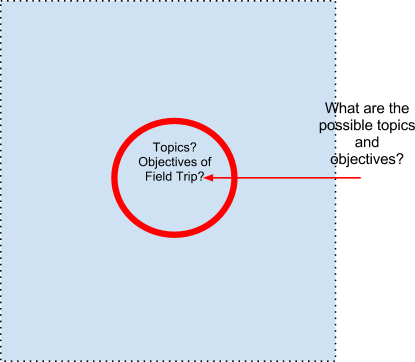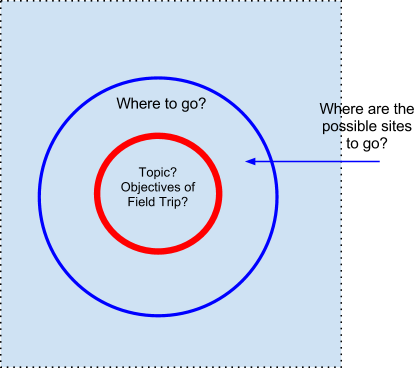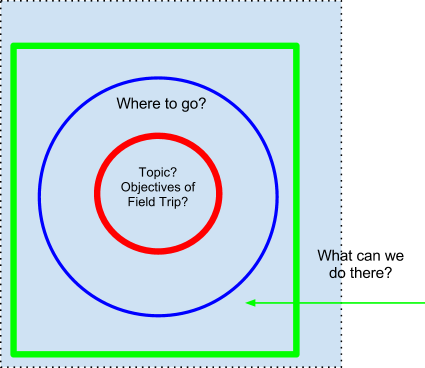Session 5.1 - Introduction to enquiry-based learning
"'You can't teach people everything they need to know. The best you can do is position them where they can find what they need to know when they need to know it."
Seymour Papert, MIT
Learning intentions and objectives.
In this session you will learn about:
- De Bono's PMI (positive/minus/interesting) technique to encourage analytical thinking
- the aims and process of enquiry-based learning
- preparing for enquiry-based learning through a series of lessons and a ‘project day’ or ‘field trip’ for mathematics or science classes
Success criteria.
To meet the learning intentions you will:
- apply DeBono's PMI technique to the fictitious scenario of plants being able to walk
- watch videos of different teachers introducing enquiry-based lessons and discuss
- in groups, decide on a suitable topic area for extended project work and plan an outline (to include learning objectives)
ICT components.
The ICT components you will focus on are
- online simulations
- how to use these in the context of EBL
Resources needed.
Resources needed for this session:
- large white piece of paper
- different colours of markers or coloured pens
- computer/laptop/netbook and internet
Review of follow-up activities from last session
If you are running a professional learning programme which follows these sessions in sequence, then you should do the review of follow-up activities relating to the previous session (More on questioning). The 'review of follow-up activities' for that session is available here, and also shown below in the session text. However, if you are following selected sessions in a different order, then you should use the reflection appropriate to the previous session you did.
The review of the follow-up activities for this session (to be done at the start of the next session) is available here.
![]() Review (10 min) of the planned activity, other strategies, and peer observation.
Review (10 min) of the planned activity, other strategies, and peer observation.
- Did you observe a buddy practising questioning in their classroom? Did your observation help your buddy? If yes, elaborate with specific examples about the changes in your buddy’s questioning after the activity. (You might want to continue the observation activity for a few more weeks)
- What did you learn by observing your buddy? Were there any questioning and handling responses strategies that you learned from your buddy?
- Did you notice any changes in pupils’ participation due to your new questioning and handling responses strategies? Share one strategy that you found most effective in your classroom. Explain reasons for why you think that the strategy was effective.
- Did you try any strategies for improving the quality of pupils’ responses? Which strategy or strategies led to chains of thinking about the content that you were teaching?
![]() Review (10 min) of netbook based activities in the classroom.
Review (10 min) of netbook based activities in the classroom.
- ICT activity – did you use the netbooks during the last week for the geogebra activity?
- Did you try anything else?
- How familiar are your students with using the netbooks?
- How familiar are you with using the netbooks?
By now the facilitator should appreciate the importance of pacing each session well by making good use of time-management techniques. This unit, like many of the others, will involve participants in many discussion, hands-on and planning activities. You may need to intervene and move things on if participants are spending too much time on an activity (in relation to the time you have available). Or you may decide that they can benefit from continuing an activity longer than anticipated, if you judge that most/all participants are still gaining new knowledge/experience from that activity. Please take note of our recommendations about whether each activity is crucial or optional. This should help you to decide on whether to spend more or less time on it.
A Taste of Enquiry-Based Learning
In this unit we will explore a way of teaching and learning that encourages students to take the initiative to pose questions and explore their curiosity about the world around them, through a process of enquiry.
![]() Whole class dialogue (5 min): Positives, Minuses, Interesting. In this Positives, Minuses, Interesting (PMI)(a) activity there are no correct answers. Doing a PMI activity involves considering the positive, negative and interesting points related to a specific scenario. It was originally developed by Edward de Bono, father of the “thinking skills” movement. It encourages learners to look at both sides of a situation and also to be creative when considering the interesting possibilities.
Whole class dialogue (5 min): Positives, Minuses, Interesting. In this Positives, Minuses, Interesting (PMI)(a) activity there are no correct answers. Doing a PMI activity involves considering the positive, negative and interesting points related to a specific scenario. It was originally developed by Edward de Bono, father of the “thinking skills” movement. It encourages learners to look at both sides of a situation and also to be creative when considering the interesting possibilities.
Consider the following imaginary scenario: Plants can now walk in our world!
(It is important to realise that plants do not need to move because they make their own food by photosynthesis – animals have to move in order to forage for food.)
What would be some positives, minuses or interesting points you can think of, if this scenario was actually true?
Possible responses:
- P (positives): the plant could move to where there is more light or water
- M (minusses): the plant would waste energy by moving
- I (interesting): we have to be sensitive and aware of plants walking on the roads and in our houses - there is a huge potential for creativity here as students explore the outrageous possibility of having plants walking around and the consequences that this may bring
For further examples, navigate to: http://www.azteachscience.co.uk/resources/continuing-professional-development/bright-ideas-in-primary-science.aspx
![]() Whole class dialogue (10 min) on enquiry-based learning. You may have heard of “enquiry-based learning” (EBL) being practised in other subjects (e.g. geography) or in higher grades through farming or industry projects. For instance, you may have heard of teachers bringing their students outside the classroom to learn about commercial and subsistence farming. The quotes below show two Zambian teacher's thoughts about enquiry-based learning; read the text, then offer your own understanding of EBL as a group.
Whole class dialogue (10 min) on enquiry-based learning. You may have heard of “enquiry-based learning” (EBL) being practised in other subjects (e.g. geography) or in higher grades through farming or industry projects. For instance, you may have heard of teachers bringing their students outside the classroom to learn about commercial and subsistence farming. The quotes below show two Zambian teacher's thoughts about enquiry-based learning; read the text, then offer your own understanding of EBL as a group.
What is Enquiry-Based Learning?
![]() Observing, thinking, reflecting (20 min) Video and discussion. Watch the following six clips showing three different teachers trying to introduce some form of enquiry in the classroom. Think about these questions as you are watching and discuss them when you have finished watching all of the clips:
Observing, thinking, reflecting (20 min) Video and discussion. Watch the following six clips showing three different teachers trying to introduce some form of enquiry in the classroom. Think about these questions as you are watching and discuss them when you have finished watching all of the clips:
- Did the three different teachers introduce the lesson in a way that is similar or different from a usual maths or science lesson in your classroom? How?
- Do you think that such a way of ‘setting up’ the lesson can engage the students productively over time? Why? Do you think your own students will enjoy this kind of lesson?
- What questions did the teachers pose to arouse the curiosity and interest of the students?
- What kinds of classroom organisation or resource are needed to support this way of teaching?
- What new skills do you think your students might need to enable them to work in this way?
Try to focus on these specific questions above rather than on the teaching style of the teacher (e.g. the classroom management/mannerism)!
Teacher 1/Clip 1: An activity on 3D shapes.
VIDEO
Introducing a net diagram activity
Introducing an activity. Noxolo is setting up the activity for students to identify which net diagram goes with which and finding the properties of each (faces/vertices/edges).
Video/Noxolo 3Dshapes 1.2-10.m4v, https://oer.opendeved.net/wiki/Video/Noxolo_3Dshapes_1.2-10.m4v,This video is available on your memory stick in the video/3D shapes folder. Duration: 4:45 watch on YouTube, local play / download options / download from dropbox)(Series: 3D shapes, episode 10)
Teacher 2/Clips 2 - 5: The Power of 2: What would you choose?
VIDEO
Introducing a problem with a story
Pindi introduces the problem ("The powers of two"). She begins the lesson by telling a story. She asks the students which option they would choose: A fixed amount of money, or a smaller amount which doubles every week. Learners give their opinion.
Video/Pindi exponentials 2.1-1.m4v, https://oer.opendeved.net/wiki/Video/Pindi_exponentials_2.1-1.m4v,This video is available on your memory stick in the video/Exponentials folder. Duration: 2:35 (Series: Exponentials, episode 01)
VIDEO
Classroom management
Classroom management. Pindi asks the learners to go to the school hall to continue the investigation.
Video/Pindi exponentials 2.3-18.m4v, https://oer.opendeved.net/wiki/Video/Pindi_exponentials_2.3-18.m4v,This video is available on your memory stick in the video/Exponentials folder. Duration: 1:56 (Series: Exponentials, episode 18)
VIDEO
Graph group work
Group work activity on drawing the graph. Pindi shows the use of the "ruler" to a group.
Video/Pindi exponentials 2.4-23.m4v, https://oer.opendeved.net/wiki/Video/Pindi_exponentials_2.4-23.m4v,This video is available on your memory stick in the video/Exponentials folder. Duration: 1:04 (Series: Exponentials, episode 23)
VIDEO
Whole group work
Pindi asking the groups to come together with their work, so that the work can be compared and discussed.
Video/Pindi exponentials 2.4-21.m4v, https://oer.opendeved.net/wiki/Video/Pindi_exponentials_2.4-21.m4v,This video is available on your memory stick in the video/Exponentials folder. Duration: 0:33 (Series: Exponentials, episode 21)
These four clips show Pindi introducing a problem involving exponentials and then taking the students to the school hall to draw the graph. Why do you think they went to the school hall?
Teacher 3/Clip 6: How can we learn mathematics through using used plastic bottles for building a house?
VIDEO
The impact of inquiry based learning
The impact of inquiry based learning on students and teacher
Video/The impact of inquiry based learning on students and teacher.mp4, https://oer.opendeved.net/wiki/Video/The_impact_of_inquiry_based_learning_on_students_and_teacher.mp4,This video is available on your memory stick in the video/Video from other organisations folder. Duration: 7:55 watch on YouTube, local play / download options / download from dropbox)(Series: Video from other organisations, episode N/A)
Additional video clips of ways to introduce EBL lessons
The previous video-watching activity could be run as a group activity rather than a whole class one, with groups watching different videos and reporting back their thoughts on them along with an outline of their contents. These additional clips could then be used to augment the previous clips. The clips may also be useful during private reflection after the session to give additional insights into how to start off an enquiry, with participants bearing the questions in mind.
Teacher 4/Clips 7 and 8
These clips show a Zambian teacher introducing the topic of air with a view to doing various enquiry-based learning activities with the students. In the clips she is arousing their curiosity by asking, 'Why do trees shake?'
VIDEO
Agness asks students to discuss why trees shake
Why do trees shake?
Video/Agness Air A02.m4v, https://oer.opendeved.net/wiki/Video/Agness_Air_A02.m4v,This video is available on your memory stick in the video/Agness Air folder. Duration: 1:34 watch on YouTube, local play / download options / download from dropbox) (Video filmed in 2012, at CBS.)(Series: Agness Air, episode 02)
VIDEO
Agness invites all groups to participate in discussion
Each group gives their answers to question 'why do trees shake?'
Video/Agness Air A03.m4v, https://oer.opendeved.net/wiki/Video/Agness_Air_A03.m4v,This video is available on your memory stick in the video/Agness Air folder. Duration: 1:05 watch on YouTube, local play / download options / download from dropbox) (Video filmed in 2012, at CBS.)(Series: Agness Air, episode 03)
Later on, she does the following demonstration:
VIDEO
Agness Air A08
Agness Air A08
Video/Agness Air A08.m4v, https://oer.opendeved.net/wiki/Video/Agness_Air_A08.m4v,This video is available on your memory stick in the video/Agness Air folder. Duration: 3:13 watch on YouTube, local play / download options / download from dropbox) (Video filmed in 2012, at CBS.)(Series: Agness Air, episode 08)
There are a number of different enquiry questions that could be asked using the 'jar over a lit candle' demonstration as a starting point. Have a think about what some of these might be.
Facilitator may like to highlight that there is a spectrum of practices of enquiry-based learning: from one that is very teacher-directed (teacher chooses the questions and organises the activities) to one that is more student-directed (teachers provides only a stimulus picture and students decide what more they would like to find out. If there is time, ask participants to discuss what would be the most appropriate form of enquiry-based learning for their classrooms currently. Most likely it will be the former rather than the latter - which is fine to start with!
![]() Whole class dialogue (10 min) - continuation of previous discussion. Continue the whole group discussion, augmenting the definition of enquiry-based learning to make it your own.
Whole class dialogue (10 min) - continuation of previous discussion. Continue the whole group discussion, augmenting the definition of enquiry-based learning to make it your own.
Benefits of Enquiry-Based Learning
![]() Observing, thinking, reflecting (10 min) on benefits of EBL. Read the following summary texts on the benefits of EBL and think about whether you are convinced by the claims of the authors? Make notes or annotations on the page if you have a paper copy and want to do so.
Observing, thinking, reflecting (10 min) on benefits of EBL. Read the following summary texts on the benefits of EBL and think about whether you are convinced by the claims of the authors? Make notes or annotations on the page if you have a paper copy and want to do so.
Enquiry-based learning helps students to be:
- inquisitive and curious about things that they experience in their everyday lives
- able to pose problems, ask questions, and recognise issues that they would like to explore
- able to develop an understanding that knowledge changes over time as people challenge, shape and contribute to it
- responsible for deciding what they learn and how they learn it
- confident that they too can challenge, shape and contribute to knowledge
- aware that there are always multiple perspectives for looking at, analysing and understanding things
- able to propose solutions to problems and questions, and to know how to pursue these solutions.
Enquiry-based teaching supports teachers to be:
- open to students’ ideas about the processes and directions of their learning
- keen to learn about how ideas and knowledge are produced in subjects other than their own
- able to research topics and make connections between ideas
- interested in students’ lives and cultures
- able to challenge students to critique, expand and build upon the knowledge they have from their own experiences and ideas.
(Taken from: http://www.enquiringminds.org.uk/)
Impact on learning. Enquiry-based teaching and learning have been shown to increase motivation and interest of learners and teachers, and can significantly increase achievement on standardised tests. The increased focus required of the learners to discuss and be involved in practical work means that there will be less emphasis on writing down factual information only. On the whole, students will be involved in more higher order thinking and this increases the level of challenge of learning for all the learners.
(Taken from “Bright Ideas in Primary Science” evaluation in 16 schools: http://cs3.brookes.ac.uk/schools/education/rescon/azsttp.html
![]() Whole class dialogue (10 min) on issues and concerns on EBL. The benefits of enquiry have been outlined but what are the issues or concerns that might arise? How can these be addressed?
Whole class dialogue (10 min) on issues and concerns on EBL. The benefits of enquiry have been outlined but what are the issues or concerns that might arise? How can these be addressed?
The facilitator should make use of the opportunity to discuss with the participants what are some challenges in making use of EBL. It may be the case that some participants would choose to focus on the negatives - lack of suitable venues, managing students, lack of time, unwilling to plan for lessons that will span across days. It will be helpful to discuss their concerns while at the same time to direct their attentions to the possibilities and strengths of EBL.
Planning an outdoor activity
![]() Same-task group work (10 min). Each group of 3-4 participants should have access to the following material:
Same-task group work (10 min). Each group of 3-4 participants should have access to the following material:
- large white piece of paper
- different coloured markers/pens
Imagine that you are very interested in bringing your students outside the classroom to learn certain maths or science concepts using an authentic ‘real-life’ approach. Up to now, the ideas have just been ‘lingering’ in your mind. You are curious to know of the possibilities and what other participants think about it! Let’s call this learning experience a “field trip” or “project day”.
Nominate a leader in your group who will read out the instructions and facilitate the group work by writing down the ideas on the sheet of white paper.
Identify Possible Objectives
Take a coloured marker/pen and write "Objectives of Field Trip" in the centre of the paper. Now circle it, as shown in the illustration below. Brainstorm on one or two maths and science topics that you would like to focus on and write within the circle. Write down as well what are the possible lesson objectives of the field trip – to help all of you to focus on generating more ideas later.
Identify Possible Sites of Learning
Use a different colour marker/pen and draw a bigger circle around the previous circle. Write down “Where to go?” at the top of the circle. Brainstorm and write down within the bigger circle, where are the possible sites you could bring your students to learn about the maths/science concepts outside the classroom. You may need to consider the practical issues of whether the site is safe for the students and whether it is easy to bring a class of students to that particular venue. (You can choose the school grounds if you want or it may in fact take place just within your classroom!) Also, consider whether the sites will be able to help students learn the objectives of your lessons.
Advancing Ideas of Possible Activities
Draw a rectangle around the previous shapes (outside the outer circle) using a different coloured marker/pen. As shown in the illustration, brainstorm and write down within the rectangle, what can we do at the various sites? Again, consider the safety and convenience issues, and whether the activities can actually serve to help students achieve the learning objectives (or whether the classroom will be actually be much better!)
Mapping and Presentation of Possible Ideas
Try to follow the different paths of ideas by connecting the ideas in different logical ways:
On our field trip which I intend to help the students to learn ___________ (topic and objective of field trip?), we could bring the students to ___________ (where to go?) where we can ______________ (do what?).
In your group, try to come up with as many different ideas as possible and decide on what are the ideas that you feel would be most workable/not so workable. State your reasons for saying so. Identify some resources that you will need to prepare for the field trip.
Present your outcomes to the rest of the participants. It will be helpful to be as specific as possible so for instance, “a lesson on a science topic on plants in the school field outside the classroom for students to explore the plants there” will be much too vague!
The facilitator should highlight to the participants that they themselves have gone through a structured enquiry-based activity in a group setting, to help them find out about the possible ways to organise a field trip for their students.
Compare the activities that were developed. Are those actually enquiry-based activities or do they have the potential to become them? Are the questions sufficiently open-ended and rich? Which of the other features of enquiry that we have identified do they have? If none, why? If so, ask them to consider why they think this is an enquiry-based learning activity?
How possible would it be for their students to make use of EBL? Do they think that such a method of learning will be well-received by the students and their parents?
ICT practice: Making use of ICT in Enquiry-Based Learning
![]() Same-task group work (20 min) on making use of ICT in EBL. Go to the ‘Balancing Act’ simulation by following the link below. Play with the simulation for a few minutes and think about how you might use it in an EBL lesson. Can you come up with one or two enquiry questions that could be investigated using the simulation? Discuss with your colleagues how students would record their answers to these questions.
Same-task group work (20 min) on making use of ICT in EBL. Go to the ‘Balancing Act’ simulation by following the link below. Play with the simulation for a few minutes and think about how you might use it in an EBL lesson. Can you come up with one or two enquiry questions that could be investigated using the simulation? Discuss with your colleagues how students would record their answers to these questions.
http://phet.colorado.edu/en/simulation/balancing-act
If time permits, think about reviewing the two gold star rated resources (Teaching Ideas) that accompany the simulation to see how they could be good exemplars for your EBL lesson.
Balancing Act Homework Activity 1 and 2.pdf
Balancing Act_Sample_Lesson.pdf
These are some possible extension activities you can choose to do in your own time:
1. Study other simulations that have been developed in the web page:
http://phet.colorado.edu/en/simulations/category/new
2. Come up with some headings under which to review the simulations and resources that this website pages could offer for an EBL lesson. For instance, you could assess the simulations and resources in terms of:
- the level of enquiry they promote
- ways of extending/differentiating the level of enquiry
- how user friendly is it for yourself and students
- how engaging will it be for the students
- the relevance to your teaching subjects or curriculum in general
Connecting with overarching goals of the programme
![]() Open space (10 min). It's now time for the "open space", that gives you an opportunity to discuss issues that have arisen, and to relate those to the broader context of the programme. Do not just gloss over this section, but make time to raise issues, and probe the progress that you are making. You could use this space to:
Open space (10 min). It's now time for the "open space", that gives you an opportunity to discuss issues that have arisen, and to relate those to the broader context of the programme. Do not just gloss over this section, but make time to raise issues, and probe the progress that you are making. You could use this space to:
- Remind yourselves of the of the Most Significant Change Technique, and e.g. collect more of your stories.
- Discuss your assessment portfolios: Is there anything that you are unsure about? Is it going well? What could be done better?
- Check on the work with the classroom assistants: Is this going well? Are there any tensions? Any observations or tips you can share?
- Reviewing individual ICT practise (such as typing practise).
- If you are preparing a presentation for other teachers, you could work on the presentation (about what you have been learning, stories emerging from MSC).
- Remind those who are doing audio diaries, to upload them.
- You could discuss any other issues that have arisen.
You will find notes and summaries of various techniques and concepts on our reference page, and you might want to refer to those for clarification during this activity if needed.
Follow-up activities
![]() Agreeing follow-up activities (5 min).
Agreeing follow-up activities (5 min).
Part 1: PORTFOLIO. Continue collecting evidence for your OER4Schools portfolio by keeping track of your planning and implementation of an enquiry project, and reflecting on what you are learning as you go through the unit. Collect paper/electronic documents to show the whole process, beginning in this workshop session and throughout Unit 5. Please include copies (e.g. photographs/photocopies) of student work throughout the stages they go through (not just finished outcomes). Your reflections can be oral using the dictaphone, you don't need to write them out, but please remember to include challenges you faced as well as benefits of new approaches you trialled.
As we are nearing the end of the year’s programme, we would also like to return to the 'most significant change' technique and ask you to use your portfolio to create a story illustrating the biggest change you feel you have made in your thinking and practice over the year.
Part 2: Start planning for an enquiry-based ‘project day’ or ‘field trip’ for your own classroom and share your ideas in the next session. The questions (similar to the small group activity just now) below should be a useful starting point for your planning. Remember that the project or field trip should allow the students to explore an enquiry idea in some depth (and not just answer some closed and surface questions).
- What is a suitable topic for the grade(s) of your students?
- What are suitable lesson objectives/success criteria?
- Where would be a suitable venue for the event?
- What kind of overall enquiry question or task could you pose? Can you phrase some further sample questions that ask learners what they know/think about some aspects of your chosen topic? What might they then like to know/find out? (Remember what ‘open-ended’ and ‘deep’ questions are (see Unit 2 on questioning and table below).
As your planning progresses, consider how you think your enquiry project might be extended to do this.
- Can you make use of the OpenOffice spreadsheet to create a database on the possible resources that you require for such an event?
- Consider also what are some administrative requirements you need to attend to to organise such an event (e.g. Do you need permission from an authority/parents? Do you need to invite a specialist speaker to talk about the topic?)
Part 3: Complete the ICT tutorials. Consider and be ready to share in the next session how the OpenOffice spreadsheet and/or GeoGebra can be a useful tool for enquiry-based lessons.
In the next session, these follow-up activities will be reviewed. If you are using this session on its own, you can have a look at the review of follow-up activities here.
Additional reading for part 2 of the follow-up activities
Guiding questions to help you plan an enquiry task
| ‘Open-ended’ Questions | ‘Deep’ Questions |
| Questions have many answers.
Examples: What could be the consequences of water contamination? How does a balanced diet help us? How could we use flowers of plants? Suggest ways to prevent spread of malaria in your community? |
Questions elicit relations between ideas and extended ideas.
Examples: What would happen if only inorganic fertilizers are used for growing plants? What connections do you see between climate of a region and its vegetation? Why is the water in the nearby pond not safe for drinking? |
These questions will according to Dr Benjamin Bloom be ‘higher-level’ thinking questions. The levels (“taxonomy”) of questions that Bloom has developed form a framework used by many teachers across the world to develop questions that help students progress from concrete to abstract thinking. You may remember it was introduced in the VVOB handout “Questioning the questions” as part of the homework for Session 4.1. The taxonomy classifies learning into six progressive levels of complexity and abstraction:
- Knowledge – students should: describe; identify; recall.
- Comprehension – students should: translate; review; report; restate.
- Application – students should: interpret; predict; show how; solve; try in a new context.
- Analysis – students should: explain; infer; analyse; question; test; criticise.
- Evaluation – students should: assess; compare and contrast; appraise; argue; select.
- Creation – students should: design; create; arrange; organise; construct.
On this scale, knowledge is the lowest-order thinking skill and creation is the highest. Enquiry-based learning aims to help students learn to analyse, evaluate and create.
Acknowledgements
We thank YouthLearn Initiative at Education Development Center (http://www.youthlearn.org/learning/planning/lesson-planning/how-inquiry/how-inquiry inquiry) and Futurelab (http://www.enquiringminds.org.uk/terms_of_use/) for kindly allowing us to use the material from their website. We also thank Professor Katja Maaß for permission to use the Primas video on the impact of inquiry-based learning on students and teachers.
At the end of each session, we provide an overview of the activities in this session, together with their suggested timings. Although this appears at the end of the session (for technical reasons), you should keep an eye on this throughout the session, to make sure that you are pacing the workshop session appropriately!
Total time: 130 (min)
Activities in this session:
- Review (10 min) of the planned activity, other strategies, and peer observation.
- Review (10 min) of netbook based activities in the classroom.
- Whole class dialogue (5 min): Positives, Minuses, Interesting.
- Whole class dialogue (10 min) on enquiry-based learning.
- Observing, thinking, reflecting (20 min) Video and discussion.
- Whole class dialogue (10 min) - continuation of previous discussion
- Observing, thinking, reflecting (10 min) on benefits of EBL.
- Whole class dialogue (10 min) on issues and concerns on EBL.
- Same-task group work(10 min).
- Same-task group work (20 min) on making use of ICT in EBL.
- Open space(10 min).
- Agreeing follow-up activities(5 min).
If you have printed this session for offline use, you may also need to download the following assets:
- Video/Noxolo 3Dshapes 1.2-10.m4v (local play / download options / download from dropbox)
- Video/Pindi exponentials 2.1-1.m4v (local play / download options / download from dropbox)
- Video/Pindi exponentials 2.3-18.m4v (local play / download options / download from dropbox)
- Video/Pindi exponentials 2.4-23.m4v (local play / download options / download from dropbox)
- Video/Pindi exponentials 2.4-21.m4v (local play / download options / download from dropbox)
- Video/The impact of inquiry based learning on students and teacher.mp4 (local play / download options / download from dropbox)
- Video/Agness Air A02.m4v (local play / download options / download from dropbox)
- Video/Agness Air A03.m4v (local play / download options / download from dropbox)
- Video/Agness Air A08.m4v (local play / download options / download from dropbox)

